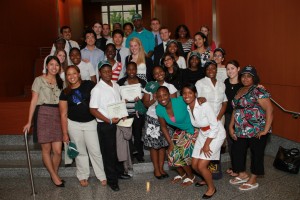The Pipeline program, an initiative led by Emory medical students to improve college readiness and promote health career interest among Atlanta high school students, held graduation ceremonies Wednesday night at Emory University School of Medicine.

Graduating seniors and their mentors. All 19 seniors have at least one college acceptance, reports Pipeline co-founder Zwade Marshall.
Leaders at South Atlanta School of Health and Medical Sciences credit Pipeline with sparking interest in health science careers and bolstering attendance and academic performance.
“We see more leadership, not just in class but in the whole building,†says Edward Anderson, a teacher who coordinates the program. “Students are picking up the torch and running with it. I believe they will be future leaders and have a great impact.â€
Sophomores, juniors, and seniors have access to a distinct curriculum with a classroom component, one-on-one mentoring by Emory undergraduates, and hands-on demonstrations. Sophomores explore infectious diseases and HIV/AIDS. Juniors study neuroscience. And seniors—who get help with college application coaching—focus on cardiology and community outreach, culminating in a health fair that they organize at their school.
Pipeline is run by Emory student volunteers with the support of the School of Medicine Office of Multicultural Medical Student Affairs, the Office of University-Community Partnerships, and the Emory Center for Science Education.




